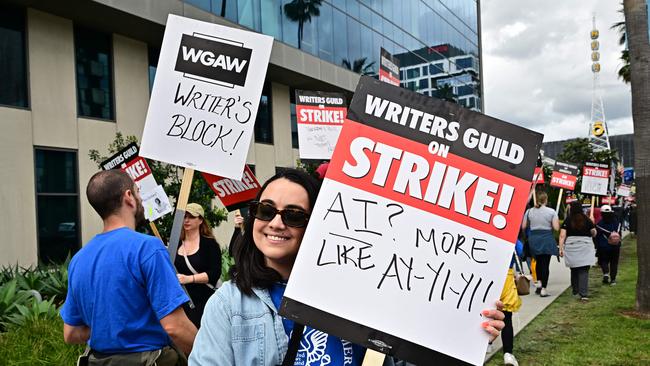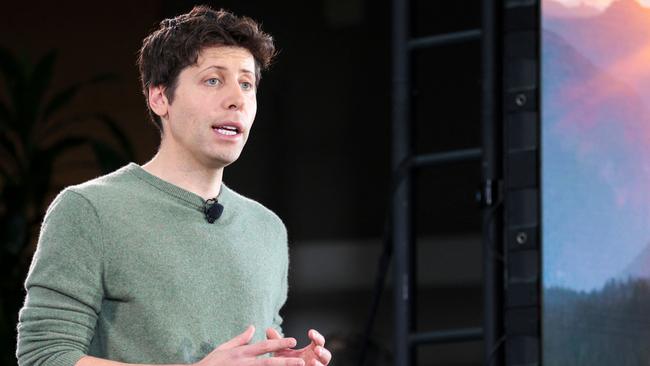Artificial intelligence may be Hollywood’s ultimate strikebreaker
For America’s striking scriptwriters, every day they’re on the picket lines their potential replacements are getting better at their job.

One wonders if the Hollywood writers’ strike, now in its third week, might inspire movie studios to rely on artificial intelligence to craft stories.
The good news for entertainment executives is that the technology appears advanced enough to express the same trendy leftism the writers do, but at a fraction of the cost. The exciting potential for producers is that they could send just as strong a progressive virtue signal but without having to address the inevitable gripes emanating from a woke workforce.
By coincidence, this intriguing news arrives via another institution based in Los Angeles, though the implications are by no means limited to the entertainment industry.
UCLA professor John Villasenor and student Jeremy Baum have written a piece for the Brookings Institution about their testing of the popular ChatGPT program. They report that “for certain combinations of issues and prompts, in our experiments ChatGPT provided consistent – and often left-leaning – answers on political-social issues”.
There are caveats. The chatbot often yields conflicting and inconsistent answers. But the UCLA researchers write “inconsistencies aside, there is a clear left-leaning political bias to many of the ChatGPT responses”.
One source of the bias may simply be that the software is trained with large volumes of material from the internet and much published media is biased.
Villasenor and Baum add: “An additional, and perhaps much more significant source of bias lies in the fact that ChatGPT has been shaped by reinforcement learning with human feedback (RLHF). As the term suggests, RLHF is a process that uses feedback from human testers to help align outputs with human values. Of course, there is a lot of human variation in how ‘values’ are interpreted. The RLHF process will shape the model using views of the people providing feedback, who will inevitably have their own biases.”
In a recent podcast, OpenAI CEO Sam Altman said: “The bias I’m most nervous about is the bias of the human feedback raters.” Asked if there were something to be said about the employees of a company affecting the bias of the system, Altman responded: “100 per cent”, noting the importance of avoiding the “groupthink” bubbles in San Francisco (where OpenAI is based) and in the field of AI.

“All of this raises the question of what to do about political bias” in such products, noted the UCLA researchers, who wisely advise the “government should not (and cannot, thanks to the First Amendment) regulate” for political bias. They suggest more awareness and transparency about biases as well as efforts to restore balance to “increase the utility of these systems to a more diverse set of users”.
They conclude: “More broadly, discussions about how chatbots exhibit bias are intertwined with how we as humans view bias. Bias is often a relative concept, and an assertion one person might consider neutral might be viewed as biased by someone else. This is one reason why building an ‘unbiased’ chatbot is an impossible goal.”
True enough, but striving to reach this goal could still yield great benefits. In the meantime, the primitive progressivism of the current technology seems like a perfect fit for Hollywood.
Also, the humans of Tinseltown might not have to share much credit with software.
In a recent article in the Los Angeles Times, Stacy Perman provided an entertaining and informative history of the writer’s search for status in Hollywood: “In 1945, barely two years into Raymond Chandler’s career as a screenwriter, the man whose hard-boiled fiction did much to make film noir into an art form had already wearied of the town and its treatment of writers.
“Hollywood is a showman’s paradise. But showmen make nothing; they exploit what someone else has made,” he wrote.
In barbed zinger after zinger, the man who gave us private investigator Philip Marlowe described Hollywood as a cauldron of “egos”, “credit stealing” and “self-promotion” where scribes were ruthlessly neglected, marginalised and stripped of respect; toiling at the mercy of producers, some of whom, he wrote, had “the artistic integrity of slot machines and the manners of a floorwalker with delusions of grandeur”.
It seems Chandler’s experience was not unique. Perman notes: During Hollywood’s Golden Age of the 1930s and 1940s, when moviemaking operated under the studio system, the moguls who ruled over the industry exhibited little appreciation for writers or the writing process.”
MGM’s Irving Thalberg once famously remarked: “What’s all this business about being a writer? It’s just putting one word after another.’’
Sadly for today’s writers, every day they’re on the picket lines their potential replacements seem to be getting better at this task.
On the other side of the country, Peter Salovey, president of Yale University, wrote: “I am in a poetry club, so I asked ChatGPT to write a poem for me. I gave it very specific instructions: a three-stanza structure, a theme (friendship), an iambic pentameter meter, and an A-B-B-A rhyming scheme. I asked it to include metaphors using acorns. In seconds, the program wrote me a poem to those specifications. The poem was not especially good. I might give it a B-, but it was not a bad first draft.”
While this result speaks to the present abilities of the technology, it is becoming more proficient quite swiftly.
WALL STREET JOURNAL






To join the conversation, please log in. Don't have an account? Register
Join the conversation, you are commenting as Logout